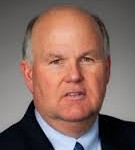It appears there is no love lost between Gary Jones and Ken Miller.
The Republican officials are at odds today over the selection of a project vendor, but that appears to be just the tip of the iceberg.
Auditor Jones, in recent months, has been critical of public officials who promote themselves while promoting state programs. Jones hasn’t named anyone, but Treasurer Miller is a prominent promoter of the Unclaimed Property Fund and the 529 College Savings Plan.
Jones wrote on Facebook, “One thing that has bothered me for years is the millions of dollars spent on self promotion by elected officials paid for at taxpayers expense. Whether it’s T.V. , radio or newspaper advertising, their name presented prominently on letterhead and envelopes and now you can add to that Facebook ads. There is a bill that would prohibit the use of public funds to promote an elected official’s name or image 6 months before an election. Why not just prohibit it completely?”
A barb from Miller’s office aimed at Jones came over the controversy involving the Oklahoma Pension Commission and the award of a contract. Jones says the Commission showed unfair bias and abused the competitive bidding process in the way it selected NEPC, LLC, to continue as the pension fund’s management consultant.
But Deputy Treasurer for Communications Tim Allen responded, saying, “Other than a statewide elected official acting like a sore loser, there’s no story here. Auditor Jones knows there is nothing improper about this selection process, but was clearly angry when his preferred vendor was not chosen.”
The Oklahoman’s Randy Ellis reported the details:
Commissioners Doug Lawrence and John Estus dispute Jones’ unfairness claim.
Jones wrote a letter to the Oklahoma Attorney General’s Office Monday asking for a review of the bidding process.
The auditor told The Oklahoman he saw several irregularities.
NEPC was not the low bidder, Jones noted.
When bids were originally submitted last October, NEPC submitted a bid of $125,000 a year plus up to $10,000 a year for expenses.
Competitor RVK, Inc., submitted a significantly lower bid of $98,000 a year plus up to $7,500 a year for expenses, Jones said.
After the bids were publicly revealed in November, commission officials went back and gave NEPC officials the opportunity to lower their bid, even though there was nothing in the commission’s request for proposals that said that was permissible, Jones said.
NEPC came back with a bid of $100,000 a year, plus up to $10,000 in expenses.
The commission voted 4-1 to accept that bid Feb. 19, even though it was still higher than the bid submitted by RVK. No one at the meeting questioned the ability of RVK to fulfill the contract, Jones said.
Jones said he found out later that RVK also was given the opportunity to lower its bid, but that company was not informed that NEPC had lowered its bid after learning how much RVK had bid.
(Note: This correction to the story: The setting of meeting dates and selection of Vice-Chairman Doug Lawrence to head up the process of selecting a management consultant were actions voted upon by the Oklahoma State Pension Commission, not actions taken solely by Commission Chairman Ken Miller. Feb. 23 was the date of the letter state Auditor Gary Jones sent to the Oklahoma Attorney General’s Office requesting a review of the bid process.)
Jones said the push to allow contractors to revise their bids apparently came out of state Treasurer Ken Miller’s office.
Process is defended
Commission Vice-Chairman Lawrence, who was appointed by Miller to work with bidders, said he gave bidders the opportunity to lower their bids after being informed by the treasurer’s office that NEPC had indicated it would be willing to lower its bid.
“In my opinion it was a fair process,” Lawrence said. “Everybody had a chance to bid and it wasn’t necessarily going to be based on the lowest price.”
Lawrence said the commission has been using NEPC for several years and commissioners are comfortable with that company and the way it presents information.
“It’s my understanding that the treasurer’s office talked to the attorney general’s office and they were informed, first off, that the commission wasn’t required to use any specific state bidding rules — but essentially we did,” Lawrence said. “They were also told that negotiations after bids are released is not an uncommon thing to have happen, either.”
Lawrence said he would have voted for RVK if NEPC had not lowered its price, but ended up voting for NEPC because the difference in their bids was rather insignificant after NEPC changed its bid.
Commissioner Estus said he thought the process was fair because each of the top three bidders were given a chance to revise their offers and said he would have voted for NEPC, even if the company hadn’t lowered its bid.
The difference in bids was “a drop in the bucket for a $24 billion system,” Estus said. “NEPC works with more public sector pension systems than any other vendor we’re aware of. They have the largest and best universe of data to pull from for analysis. They give us really good information … We feel like their data is the best.”





I stand with Ken Miller. There’s more to Mr. Jones than meets the eye.